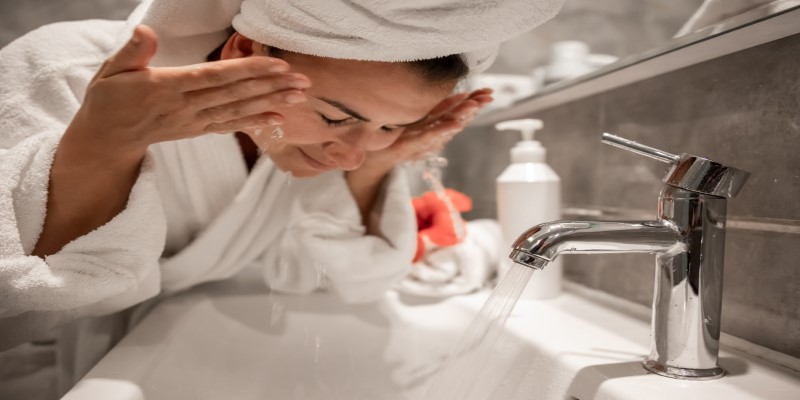Do you find yourself blotting your face with tissue every few hours, or are you constantly on the lookout for oil-absorbing products? If so, you're probably among the many individuals who struggle with oily skin. Fear not, for you're not alone in this battle. Oily skin is a common issue, and the reasons behind it can vary from person to person.
In this article, we're going to delve into the mysteries of oily skin. What causes it, how you can manage it, and why a little bit of oil isn't necessarily a bad thing. Let's get to the root of the matter and unmask the secrets behind that shine.
Understanding Oily Skin
Before we start investigating the causes of oily skin, it's essential to comprehend what it actually is. Oily skin is mainly characterized by the overproduction of sebum. Sebum is a natural oil produced by the sebaceous glands in your skin. It's crucial for keeping your skin moisturized and protected.
However, when your sebaceous glands go into overdrive, they produce more sebum than your skin needs. This excess oil can result in a shiny complexion enlarged pores, and can often lead to acne breakouts. While oily skin is more common in teenagers due to hormonal changes, it can affect people of all ages.
Primary Causes Behind Oily Skin
Now that we've established what oily skin is let's dive into the primary factors causing your skin to go into oil production overkill.
Genetics
Oily skin is often a family affair. If your parents or grandparents had it, there's a good chance you inherited it, too. Thanks, genetics! Your genes influence the size and activity of your sebaceous glands. If they are naturally predisposed to produce more oil, you're likely to have oily skin.
While you can't change your genetics, you can control how you manage your skin. So, even if your DNA stacked the deck against you, there's hope for managing your oily skin effectively.
Hormones

Hormones play a massive role in your skin's oil production. And it's not just teenagers who experience this rollercoaster. Hormonal fluctuations can affect people of all ages, leading to an oilier complexion. These fluctuations might occur due to:
- Puberty: Adolescents experience a surge in hormones, which can lead to oily skin and acne.
- Menstruation: Women often notice an increase in oiliness before and during their periods.
- Pregnancy: Hormonal changes during pregnancy can cause temporary oiliness.
To keep hormonal fluctuations from running your skin's sebum production, consider consulting a dermatologist who can recommend treatments or medications to balance your hormones.
Skincare Products
Ironically, the very products you use to control oily skin can sometimes be the culprits behind the oiliness. When you use harsh cleansers or overuse acne treatments, your skin can become dry, and in response, it might produce even more oil to compensate.
To avoid this vicious cycle, opt for gentle, oil-free, and non-comedogenic skincare products. These won't clog your pores or strip your skin of its natural moisture.
Diet
You are what you eat, and this holds for your skin, too. Consuming a diet including sugary, greasy, and processed foods can contribute to oily skin. These foods can trigger an increase in insulin levels, which in turn stimulates your sebaceous glands to produce more oil. To maintain balanced oil production, include more fruits, vegetables, and whole grains in your diet.
Weather
The weather has a significant influence on your skin. During hot and humid conditions, your skin's oil production tends to kick into high gear as a way to cool you down and protect itself. On the other hand, cold and dry weather can strip your skin of its natural moisture, leading to increased oil production as your skin tries to compensate for the dryness.
Adjust your skincare routine according to the season. For instance, use a lightweight, oil-free moisturizer in hot weather and switch to a more hydrating one in cold, dry conditions.
Overwashing
You might think that washing your face more often will reduce oiliness, but this is a common misconception. Overwashing your face can strip away the natural oils, leading your sebaceous glands to produce more sebum to compensate. Stick to a gentle cleansing routine twice a day to maintain your skin's balance.

Stress
Stress is a silent culprit behind many skin issues, including oily skin. When you're stressed, your body releases hormones like cortisol, which can trigger an increase in oil production. Finding healthy ways to manage stress, like exercise, meditation, or deep breathing, can help keep your skin in check.
Medications
Certain medications can have oily skin as a side effect. These might include hormonal contraceptives, corticosteroids, and some antidepressants. If you suspect your medication is contributing to your skin issues, consult your healthcare provider for alternative options.
How to Manage Oily Skin?
Now that you know the primary causes behind oily skin, let's talk about managing it effectively.
Stick to a Gentle Cleanser: Choose a mild, sulfate-free cleanser to remove excess oil and impurities without stripping your skin of its natural moisture.
Exfoliate: Regular exfoliation can help remove dead skin cells that can clog pores and contribute to oiliness. Use a gentle exfoliant a few times a week.
Hydrate: Even oily skin needs hydration. Opt for a lightweight, oil-free moisturizer to keep your skin balanced.
Sunscreen: Don't skip sunscreen. Look for a non-comedogenic, oil-free sunscreen to protect your skin from the sun's harmful effects.
Consult a Dermatologist: If your oily skin is causing persistent problems or self-care isn't effective, it's a good idea to seek advice from a dermatologist. They can recommend treatments or medications tailored to your specific needs.
Conclusion
Oily skin is a common condition with various underlying causes, including genetics, hormones, skincare products, diet, weather, and more. Understanding these factors is the first step in effectively managing oily skin. Remember, it's essential to strike a balance in caring for your skin so it remains healthy and radiant. Don't let the shine get you down – embrace your natural glow!




